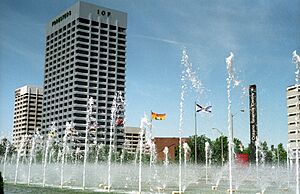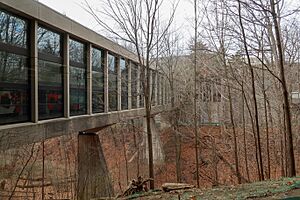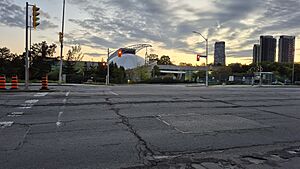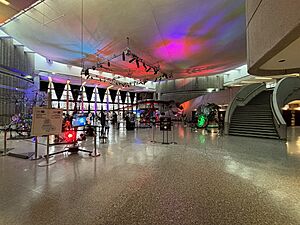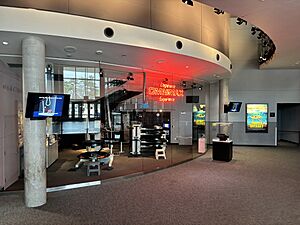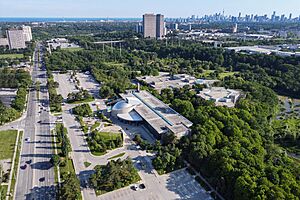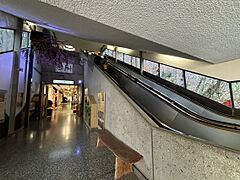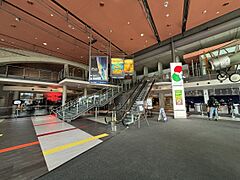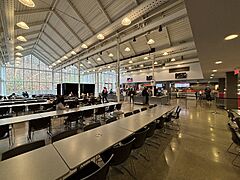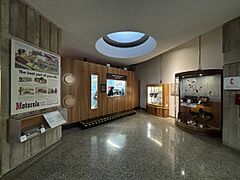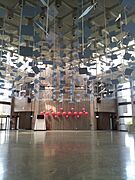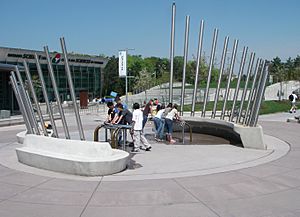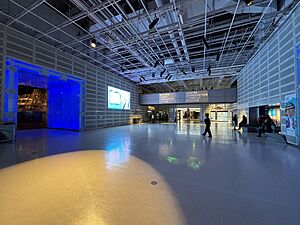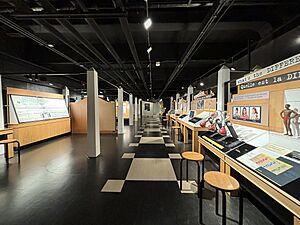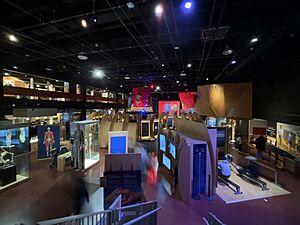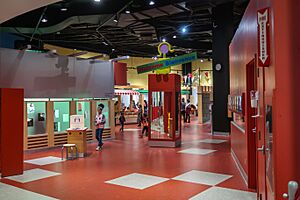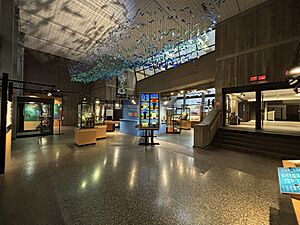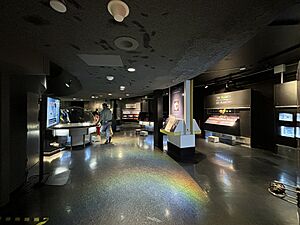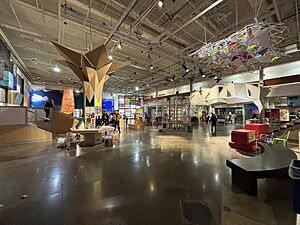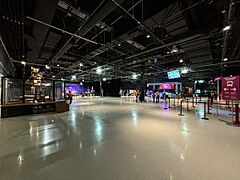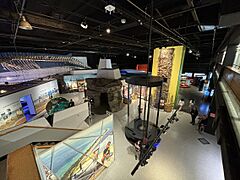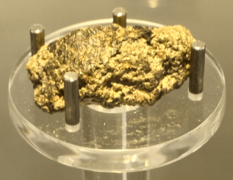Ontario Science Centre facts for kids
 |
|
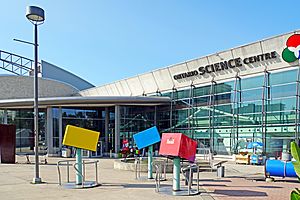
Ontario Science Centre in 2017
|
|
| Lua error in Module:Location_map at line 420: attempt to index field 'wikibase' (a nil value). | |
| Former name | Centennial Museum of Science and Technology |
|---|---|
| Established | September 26, 1969 |
| Location | 770 Don Mills Road Toronto, Ontario M3C 1T3 |
| Type | Science centre |
| Accreditation | Association of Science and Technology Centers (ASTC) |
| Visitors | 900,225 |
| Architect | Raymond Moriyama |
| Owner | Government of Ontario |
| Nearest parking | Paid parking on site |
The Ontario Science Centre (OSC) was a popular science museum in Toronto, Ontario, Canada. It was first called the Centennial Museum of Science and Technology. The original building opened in September 1969. It was located near the Don Valley Parkway in North York, about 11 kilometers (7 miles) northeast of downtown Toronto. The Centre was built into the side of a wooded ravine near the Don River.
In 2023, the government of Ontario announced plans to replace the Science Centre with a smaller one on the Toronto waterfront. In 2024, the government stated the Don Mills location would close for good. This was because an engineering report found a high risk of the roof collapsing. Both of these decisions caused a lot of public disagreement.
Contents
The Story of the Science Centre
Building and Opening
Planning for the Science Centre began in 1961. This was during a time when Toronto was growing quickly. In August 1964, Ontario's Premier John Robarts announced the creation of the Centennial Centre of Science and Technology. It was a special project to celebrate Canada's 100th birthday.
Toronto architect Raymond Moriyama was chosen to design the building. Construction started in 1966. The goal was to open the Centre as part of the Canadian Centennial celebrations in 1967.
However, construction took longer than expected. The Science Centre did not open until two years later, on September 26, 1969. The official opening was held on the morning of September 27 for special guests. It then opened to 30,000 invited guests in the early afternoon. The general public could visit starting September 28, and 9,000 people came that day. Its first advertising slogan was: "Come see what would happen if Albert Einstein and Walt Disney had gotten together."
The buildings were designed in a style called Brutalist architecture. This style uses a lot of raw concrete and has a strong, bold look.
When it first opened, the Science Centre was a leader in hands-on learning. It was one of the first places where visitors could interact with exhibits. Most exhibits were interactive, meaning you could touch and try them. Many others were live demonstrations, like metalworking. The Communications room had computer displays, including a popular tic-tac-toe game. This game ran on a PDP-11 minicomputer.
By 1974, about 250,000 students visited the Centre on field trips each year.
Operations from 1990 to 2022
In 2001, the Centre started a big project called "Agents of Change." This project focused on new ideas and updated about 85% of the Centre's public areas. Seven new experience areas were created. The Centre received $47.5 million from the government and private companies for this project. The "Agents of Change" transformation finished in 2007. This included the opening of the Weston Family Innovation Centre and the Teluscape plaza.
During the COVID-19 pandemic in Ontario, the Science Centre received $500,000 from the Government of Canada. This money was used to encourage children and their families to get COVID-19 vaccines.
Building Issues and Closure
By 2023, the pedestrian bridge leading to the exhibits was closed due to structural problems. A shuttle bus then took visitors from the main entrance to Level 6. This was the main exhibit area at the bottom of the ravine. The buses were custom-built minibuses. No plans to fix or replace the bridge were announced before the site closed.
On April 18, 2023, Premier Doug Ford announced plans to tear down the Science Centre. He wanted to move it to a new building on Toronto's waterfront. This announcement caused a lot of public anger. People worried about the new location being smaller and losing exhibits. They also worried about the name of the nearby subway station. Groups like the Architectural Conservancy of Ontario spoke out against the move. A group called Save Ontario's Science Centre organized protests. Toronto City Council also tried to keep the Centre at its original spot.
In December 2023, the Auditor General of Ontario looked into the government's decision. The Auditor General found that the decision was "not fully informed." It was based on early and incomplete cost information. Also, it happened without talking to important groups or having a clear plan for the old site.
On June 21, 2024, the Ministry of Infrastructure announced the immediate closure of the Don Mills location. They said an engineering report showed water damage to 2-6% of the building's roofs. The report estimated repairs would cost at least $22 million and take two years. Safety concerns about the roof material, called reinforced autoclaved aerated concrete (RAAC), had caused many buildings in the United Kingdom to close in 2023. About 400 public buildings in Ontario have RAAC. The Science Centre was the only one in Ontario closed because of these concerns.
Instead of fixing the building, the government sped up its plan to move the Science Centre to the waterfront. They aimed for a 2028 opening, with a temporary location planned for January 2026. This caused more criticism. Even the firm founded by the Science Centre's designer, Moriyama Teshima Architects, spoke out. Private donors, including Geoffrey Hinton, offered up to $1 million to pay for repairs. However, the province did not respond to these offers.
By October 31, 2024, most exhibits were moved to storage. Animals and plants were transferred to the Toronto Zoo and The Village at Black Creek. Temporary exhibits have since opened at Sherway Gardens and Toronto's Harbourfront Centre.
In December 2024, the Auditor General of Ontario again questioned the financial wisdom of the move. The government had said the move would save $257 million over 50 years. But the Auditor General found that moving costs had already reached about $400 million. This was more than the expected savings.
In May 2025, Canadian Architect magazine reported on early versions of the engineering report. These drafts, obtained through a freedom of information request, had recommended routine repairs, not closure, up to May 2024. This, along with earlier reports, suggested that stronger language about the need for closure was added later. This language was then used to justify the closure in June 2024.
The Centre's Design and Features
Building Design
The original buildings were designed in the early 1960s. They are an example of the Brutalist architectural style. The complex has three main buildings. These are connected by bridges and escalators. The Centre is set in a parkland of over 100 acres. The buildings were built carefully to avoid removing or damaging old trees. This made them seem to "fit naturally into their environment." They follow the natural shape of the Don River ravine, going down into it. Ontario's only IMAX Dome theatre opened here in 1996.
The Great Hall is a large event space. It used to be home to Cloud. This was a huge, computer-controlled moving sculpture by Toronto artist David Rokeby. It had blue and clear squares that rotated to show solid, liquid, and gas states. This installation has since been removed.
For most of its history, the Science Centre had a demonstration amateur radio station. It was once in the Hall of Space. Later, it moved to Level 4. Licensed amateur radio operators volunteered there daily. The station's call sign is "VE3OSC."
-
Buildings connected by escalators.
-
The Great Hall once held Cloud, a kinetic sculpture by David Rokeby. This installation has been removed.
Outdoor Plaza
Lotic Meander by Stacy Levy is an outdoor art piece. It is made of polished granite and glass. It shows how water moves in a stream. In 2007, the Ontario Science Centre opened the Teluscape Exploration Plaza. This plaza had several interactive exhibits outside the main entrance.
The FUNtain Aquatic Play Area
The Science Centre originally had a large fountain area in front of the entrance. This fountain helped cool the building. The old fountain was updated to create a more welcoming entrance. The new plaza, called "Teluscape," opened on September 20, 2006. It was accessible 24 hours a day.
The new fountain is a hydraulophone. This is a musical instrument that uses water. It was designed by artist Steve Mann. Anyone could play it by blocking the flow of its 57 water jets. This redirected water to organ pipes, making sounds. The lowest notes were visible as pipes in a circle.
The hydraulophone needed to be shut down and drained in cold weather to prevent freezing. In November 2007, it was temporarily switched to air operation. This made it a "pneumatic-play" facility, where visitors could play with air jets. In this mode, the fountain became a wind instrument.
As of 2023, the hydraulophone was not working. This was due to algae buildup, leaks, and pump problems.
Exhibitions and Galleries
The Science Centre hosted many special traveling exhibits. In 1982, the "China: 7,000 Years of Discovery" exhibit broke all attendance records. It attracted over 1.5 million visitors.
In 2003, the "Strange Matter" exhibit opened. In 2005, the "Body Worlds 2" exhibit brought almost half a million visitors. The "Facing Mars" exhibit ran in 2008. In 2010, the Centre hosted "Harry Potter: The Exhibition". This was a collection of props from the film series. "Leonardo da Vinci's Workshop" (2011) showed models of da Vinci's inventions. "Circus: The Exhibition" ran in 2012. "Game On 2.0," a video game history exhibit, ran from March to September 2013.
In June 2014, "The Science of Rock 'N' Roll" explored how science and technology changed music. In summer 2015, the Centre hosted "MythBusters: The Explosive Exhibition." This was based on the TV show MythBusters. In 2017, for Canada's 150th anniversary, the Centre opened "Canada 150: Discovery Way." This exhibit featured Canadian inventions and new ideas.
Permanent Galleries
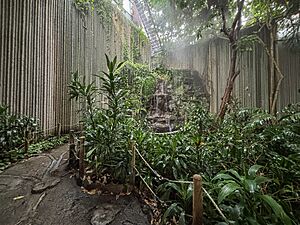
The Science Centre had hundreds of permanent exhibits. These covered topics like geology, nature, astronomy, music, technology, the human body, and communication.
A Question of Truth
"A Question of Truth" was an exhibit set up in 2000. It explored how scientific research is done. It also looked at different ways of thinking and beliefs. Visitors could test controversial ideas.
AstraZeneca Human Edge
The AstraZeneca Human Edge replaced the original human anatomy gallery. It opened in December 2013. This exhibit explored the amazing things the human body can do. It had activities that let visitors feel what it's like to be an adventurer or an elite athlete. There were over 80 exhibits. These were all created by the Science Centre's staff. The exhibit also featured a climbing wall.
Cohon Family Nature Escape
The Cohon Family Nature Escape was an outdoor exhibit. It was located in the Don River valley behind the Science Centre. It featured a giant Baltimore oriole nest. There was also a concrete wall for moss graffiti. A playground slide was made from a fallen 125-year-old eastern white pine tree.
Forest Lane
Forest Lane displayed different trees and tree trunks from across Canada. The exhibit included a 464-year-old Douglas fir tree. Its growth rings showed important world events that happened during the tree's life.
KidSpark
KidSpark was a special area for children aged eight and under. It was a place for them to explore and learn through play. This exhibition opened in 2003. It also had a rolling ball machine built by George Rhoads. There was also a music studio.
Living Earth
The Living Earth exhibit showed different environments from around the world. These included simulated rainforests, coral reefs, and caves. It also featured live animals. This exhibit opened in 1993.
Science Arcade
The Science Arcade was one of the oldest exhibits. It had been a permanent part of the Centre since it opened in 1969. The Science Arcade had many "arcade-styled" games.
Space Hall and the Planetarium
The Space Hall was updated in the late 2000s. It featured meteorites from Mars. It also had one of the few Moon rocks on public display in Canada. The Ontario Science Centre also had Toronto's only working public planetarium. The other one, McLaughlin Planetarium, closed in 1995.
Weston Family Innovation Centre
The Weston Family Innovation Centre encouraged visitors to experiment. It had exhibits where you could design a new type of shoe. You could also test your flying skills. The Weston Family Innovation Centre was home to Pipe Dreams by Bruce Shapiro. This was a bubble art installation.
Gallery
-
A raccoon at the Cohon Family Nature Escape. This outdoor exhibit is located behind the science centre, within the Don Valley.
Science School
The Ontario Science Centre Science School (OSCSS) offered high school courses. These were for grade 12 students preparing for university. The subjects included STEM topics like physics, biology, chemistry, and math. All students also earned a credit in science communication. The Toronto District School Board or the Toronto Catholic District School Board provided the credits. They also funded the program, so it was free for students from anywhere in Ontario. While at the Science Centre, students gained experience by volunteering and talking with visitors.
Governance
The Ontario Science Centre was a Crown agency of the Government of Ontario. This means it was overseen by a board of trustees. These trustees were chosen by the Lieutenant Governor in Council. There were usually between sixteen and twenty-six trustees. One was chosen as chair and another as vice-chair. Meetings were held four times a year. Trustees served for up to three years and could be reappointed.
Affiliations
The Ontario Science Centre was connected to several organizations. These included the Canadian Museums Association (CMA) and the Canadian Heritage Information Network (CHIN). It was also part of the Virtual Museum of Canada. The Ontario Science Centre was a member of the international Association of Science-Technology Centers (ASTC).
In the Media
The Ontario Science Centre was featured on the Rick Mercer Report in 2016. In his CBC news satire show, Rick Mercer visited exhibits. He took part in a wildlife conservation show. He also joined a psychology study during a workshop there.
The Grand Hall of the Centre was used as an airport terminal in episode 5 of the miniseries Station Eleven. The creators of the series hoped the building would be saved after its closure.
The controversy around the Centre's closure was shown in a May 2025 episode of Law & Order Toronto: Criminal Intent. The episode mentioned the closure of a fictional "Toronto Centre of Science."
See also
- List of science centers
 | Precious Adams |
 | Lauren Anderson |
 | Janet Collins |


